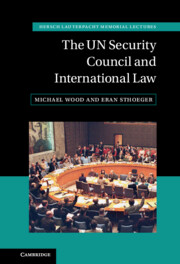Book contents
- The UN Security Council and International Law
- Hersch Lauterpacht Memorial Lectures
- The UN Security Council and International Law
- Copyright page
- Contents
- Preface
- Note on Writings
- Note on Documentation and References
- Table of Cases
- Abbreviations
- Introduction
- 1 The Legal Nature of the Security Council
- 2 Decisions of the Security Council
- 3 The Powers of the Security Council
- 4 Limits on the Powers of the Security Council
- 5 The Security Council and Measures Not Involving the Use of Force
- 6 The Security Council and the Use of Force
- 7 The Security Council, International Organizations, and the Use of Force
- 8 The Security Council and the International Court of Justice
- 9 The Contribution of the Security Council to the Development of International Law
- Conclusion
- Bibliography
- Index
1 - The Legal Nature of the Security Council
Published online by Cambridge University Press: 02 June 2022
- The UN Security Council and International Law
- Hersch Lauterpacht Memorial Lectures
- The UN Security Council and International Law
- Copyright page
- Contents
- Preface
- Note on Writings
- Note on Documentation and References
- Table of Cases
- Abbreviations
- Introduction
- 1 The Legal Nature of the Security Council
- 2 Decisions of the Security Council
- 3 The Powers of the Security Council
- 4 Limits on the Powers of the Security Council
- 5 The Security Council and Measures Not Involving the Use of Force
- 6 The Security Council and the Use of Force
- 7 The Security Council, International Organizations, and the Use of Force
- 8 The Security Council and the International Court of Justice
- 9 The Contribution of the Security Council to the Development of International Law
- Conclusion
- Bibliography
- Index
Summary
This chapter discusses the legal nature of the Security Council. It first defines the law applicable to the Council and then its nature as an organ of the UN, not a separate legal entity. It addresses and dismisses attemps to compare the Council to an executive, legislative or quasi-judicial body. Rather it is a UN organ with the primary resposibility for international peace and security, and that is what defines its legal nature. ThecChapter also addresses issues of the supremacy of legal obligations under the UN Charter over other sources of law, including binding decisions of the Council.
Keywords
- Type
- Chapter
- Information
- The UN Security Council and International Law , pp. 5 - 27Publisher: Cambridge University PressPrint publication year: 2022
- 2
- Cited by

